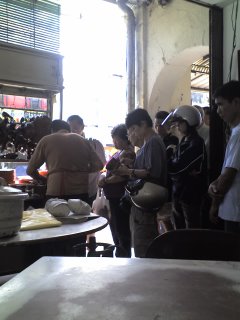As usual, the shop was crowded.
 With a glass of ice tea, I gazed upon the crowd of people and let thoughts flowed through my head. "Such a long queue", I thought.
With a glass of ice tea, I gazed upon the crowd of people and let thoughts flowed through my head. "Such a long queue", I thought.I started to ask myself questions.
Question 1: Why this stall is so crowded?
Answer: Because the roasted duck tastes good.
Question 2: As a customer, will I be happier if the food comes faster?
Answer: Oh yes, I am dead hungry.
Question 3: Why customers are waiting?
Answer: Overwhelming orders. The stall owner is preparing food non-stop.
Now I could easily model this using queueing theory. To make life simpler, I assumed the arrival rate and processing rate as constants.
a: Arrival rate (traditionally called lambda)In front of us is a queueing system with one server. The queue was building up, obviously the load, defined as a/b, was greater than 1, i.e. a > b. This is an unstable system when the queue is of finite length.
b: Processing rate (traditionally called mu)
The next question is: how to remove the bottle-neck?
There are 2 ways that I could think of: Increase number of people serving, or increase the processing rate. The latter doesn't seem viable, because I believe the stall owner will try to maximise profit by churning out as many outputs as possible, he has no incentive to drag. Therefore any effort to increase the speed may most probably result some extra flesh beside duck's meat on the plate.
We are left with option 1, which is to increase server number. The owner may want to save cost by not hiring any helpers, but does he really save money by doing that, or he will gain even more by selling more, making customers happier, while providing a job to some poor soul?
This is an interesting question. Let's stretch this even further: assuming the food quality doesn't deteriorate, he could open a few more outlets. At that time, what he needs to do is to ensure the quality of the roasted ducks remains the same. He may earn much more while doing less, because he hires others to do the donkey work. Market elasticity test may need to be carried out to ensure market is test for the optimum outlet size...
(My food arrived at this point and I forgot the rest of my thoughts)
 Finally. Conclusion:
Finally. Conclusion:I am not doing this analysis completely for fun, there is a message within it: Opportunities to improve things abound, decisions are with us most of the time.
I invite you to do a deep retrospect, and optimize bit by bit. Have you found your bottle-neck lately?
It is addictive to do thought experiments like this.
2 comments:
I thought you wanted to say:
I started to ask myself questions. If I were a duck, would I get such a long queue of customers? ;)
He may get a helper, but maybe he's happy with what he's earning. Most of these stalls like to keep the secret within the family. They don't want an outsider to learn the trade.
Also, can he prepare more ducks for 2 to chop up? Are the customers already satisfied enough with the current service to keep coming back? Can he get much more customers with faster service? If he doubles the speed of serving but the number of customers increase by only 10 or 20 %, then he might have a lot of idle time. :)
The first one I don't regard it as a question because I have a long queue of leng lui interested in me even I am not up for sale. Ok ok, time to wake up and quit dreaming. :P
What I referred will be to get one helper to chop the ducks and he just needs to keep an eye on the quality.
The rest of the questions are valid, and can only be answered through some experiments and elasticity test for the demand. My gut feeling is adding one helper to prepare the food will help his business.
Ooi you didn't update your blog for a long time!! Sue you.
Post a Comment